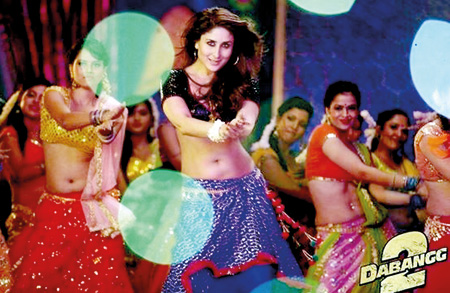Sunday Times 2
Bollywood and sex education
View(s):By Shilpa Jamkhandikar
NEW DELHI (Reuters) – A couple of weeks ago, I watched a Marathi film called “Balak Palak” (Children and Parents). A new crop of film-makers is portraying the burgeoning Indian middle class with its own set of problems and “Balak Palak” is no different.
Director Ravi Jadhav chronicles the lives of four school students and their first encounter with adult literature and how it alters their friendship. In the background is middle-class morality, which prevents parents from talking openly about the birds and the bees with their children, considers any such talk “dirty” but is clueless about dealing with their curiosity.

Tandoori chicken: Kareena Kapoor dances in “Dabangg 2” (Reuters)
Jadhav narrates the story beautifully and despite its subject, “Balak Palak” never goes into sleazy territory. I couldn’t help but think of another film I watched recently. “Dabangg 2″ has an item number in which the heroine refers to herself as a piece of tandoori chicken, to be washed down with alcohol.
Bollywood, much like the huge middle class it counts as its audience, has never quite been able to deal with sex. It prefers to avoid it (for many years, an image of two flowers pressed together meant the hero and heroine were going to “do it”) or commercialise it to such an extent that sex and sexuality are given a sleazy veneer, something to be ogled at or spoken of in whispers.
Even in today’s liberated film industry, it takes the odd Dibakar Banerjee or Anurag Kashyap to talk about sex in a way that won’t make you cringe. Banerjee’s 2010 film “Love, Sex Aur Dhokha” (Love, Sex and Betrayal) was the potent comment on India’s attitudes to sex, and the fact that these attitudes aren’t just limited to urban, upwardly mobile Indians but are also prevalent in smaller towns.
In an interview to Reuters, Banerjee said his mother didn’t repeat the name of the film he was making, because she didn’t want to say the word “sex”.
So, to hide the fact that we are prudes, we pretend to package sex in the form of item numbers and skimpily clad heroines, titillating audiences but hiding behind the morality of never actually showing or speaking of the act. Most of our heroines are virgins while all the vamps are women who have had affairs before marriage. As recently as 2012, “Cocktail” depicted a man choosing the “good” Indian girl over her alcoholic, promiscuous friend.
Which is why Bollywood needs to borrow a page from regional cinema and make movies like “Balak Palak”. India needs to grow up and have a frank talk about sex and the country’s biggest cultural influencer can initiate the conversation.
Follow @timesonlinelk
comments powered by Disqus















